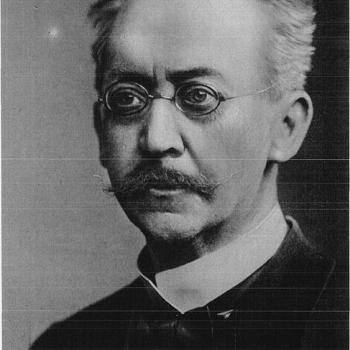Henry Karlson’s Bizarre Antipathy Towards Scriptural and Pauline Apologetics Methodology

Henry Karlson, a Catholic writer at Patheos, has put up yet another of his hit-pieces against conventional biblical apologetics, entitled, Apologists Must Embrace Charity Not Argumentation As The Foundation Of Their Work (10-10-21). It’s one of a long line of his polemics along these lines. See my critique: Henry Karlson’s Odd Obsession with Anti-Apologetics (12-19-19).
Not only does he make the utterly obvious point that all apologetics must be done in and with love and without pride (no conscious, sane apologist I have ever met would ever dream of denying that), but he has to go much further and trash the very method of rational argumentation or dispute or debate itself. Here is what he (rather ludicrously) stated:
Argument and debate have little to no room for grace . . .
He [St. Paul] had to come to realize the greater truth and that the means to realize that greater truth came from grace, and not from argumentation . . .
Paul became a great preacher of the faith when he realized this; when his mission was one of grace, he could and would share the grace he accepted and changed him; he could help others experience grace and with it the presence of God in their lives. For it is in that presence faith grows, as through it, one can learn truths which can never be spoken, truths which could not be properly expounded upon through any form of argumentation. . . .
Apologetics has a place in the Christian faith. It should not be about making converts through argumentation, for that is not how true conversion is established.
Karslon clarified this in the combox for his article:
I didn’t say anything about argument and debate being “unbiblical” (however, 2 Tim 2:14 and 2Tim 2:23 connect with my theme, which is about useless quarrelling and debates). The whole discussion is about people who are argumentative and quarrelsome by nature; it is not about rejection the use of rational arguments when they are appropriate. This is why someone must be careful and not equivocate on the term argument to create a strawman position on what I have said here (not saying you have, but I know others who have). Scripture, the saints, spiritual masters all remind us to not be seeking people to debate, to cause problems and think by doing so, we will win people over (similar to the way we should not seek martyrdom and think if we die that we are martyrs). And so, I was clear, there is room for proper apologetics, but when it all becomes a show and all about debates, then such apologists remind me of Abelard who thought himself superior to all and sought to make a name for himself by the way he debated others (which it did do, we can see the spiritual fallout of his attitude as well in the rest of his life).
This is not, however, what he stated above. He was bashing argumentation and dispute in and of themselves, not merely when engaged in with unworthy motivations and in pride. He threw the baby out with the bathwater. He did not critique only the shortcomings of being quarrelsome or contentious in these statements. If he had, I would have heartily agreed with him (I wouldn’t have even written this article). He needs to, therefore, retract these statements or modify them in order to not give the impression of arguing what it seems to me he was indeed clearly arguing.
Nor does Holy Scripture decry the notion of “seeking people to debate“: as my excerpts below prove. St. Paul, by deliberate intention, sought out dialogue and the debate that would inevitably occur when he was talking with both Jews and pagan Greeks (such as on Mars Hill in Athens). He was prepared to cite pagan poets and philosophers in the midst of these dialogues (as on Mars Hill). The Bible says that the Apostle Paul “went in, as was his custom, and for three weeks he argued with them [in the synagogues] from the scriptures” (Acts 17:2, RSV, as throughout), and “argued in the synagogue with the Jews and the devout persons, and in the market place every day” (Acts 17:17), and “argued in the synagogue every sabbath” (Acts 18:4), and that he “went into the synagogue and argued with the Jews” (Acts 18:19), and that “he entered the synagogue and for three months spoke boldly, arguing and pleading about the kingdom of God” (Acts 19:8), and “argued daily in the hall of Tyran’nus. This continued for two years” (Acts 19:9-10).
St. Paul not only did what Karlson claims he should not do, he did so, as the book of Acts informs us, for long periods of time: “three weeks” (Acts 17:2), “every day” (for who knows how long) (17:17), “every Sabbath” (18:4), “three months” (Acts 19:8), and “daily . . . for two years” (19:9-10).
And, of course, he was successful in these efforts of seeking dialogues and debates for evangelistic purposes. Karlson falsely claimed that it was untrue that “by doing so, we will win people over.” To the contrary, the Bible reports: “And some of them [Jews] were persuaded, and joined Paul and Silas; as did a great many of the devout Greeks and not a few of the leading women” (17:4), and that he “persuaded Jews and Greeks” (18:4). After his famous discourse on Mars Hill (Acts 17), it is written that “others said, ‘We will hear you again about this’ ” (17:32), and that “some men joined him and believed, among them Dionys’ius the Are-op’agite and a woman named Dam’aris and others with them” (17:34). The pagan Greek Demetrius was alarmed that “you see and hear that not only at Ephesus but almost throughout all Asia this Paul has persuaded and turned away a considerable company of people” (19:26).
St. Paul wrote: “I have become all things to all men, that I might by all means save some” (1 Cor 9:22). With the philosophical Greeks, he certainly engaged in philosophical disputation. He would have had to do so in order to persuade them. And we see an example of him doing exactly that on Mars Hill: applying his own expressed methodology.
Lastly, lest Karlson claim that these activities were only for Paul, but not for (at least potentially) any and every Christian, Paul repeatedly urges us to imitate him (1 Cor 4:16; 11:1; Phil 3:17; 4:9; 1 Thess 1:6; 2 Thess 3:7-9).
Karlson draws several false dichotomies. In his title, he pits argumentation directly against charity, and in these other statements he pits it against grace and conversion to Christ. The only logical conclusion we can draw from such extreme statements is that he has rejected argumentation altogether for the sake of the gospel and the apologetics that defends it and the doctrines of the faith. This is self-refuting and viciously circular because this very post of his is an extended argument that argumentation itself, by nature, isn’t charitable or in harmony with grace. Absurd!
Karlson cites exactly one Bible passage and makes passing reference to one more. I will provide below many biblical sanctions of (contrary to Karlson’s unhinged rantings) rational argumentation, dispute, debate, and dialogue as a means to both (lovingly) preach and defend the gospel:
1 Peter 3:15 (RSV) but in your hearts reverence Christ as Lord. Always be prepared to make a defense to any one who calls you to account for the hope that is in you, yet do it with gentleness and reverence;
The Greek word for defense is apologia, which occurs eight times in the NT. It is the word from which the English apology is derived, but in its classical definition, it did not mean an admission of wrong, but rather, a defense or justification of a belief. Apologetics, or the defense of the Christian faith, also comes from the same word. Students of philosophy or classics (or perhaps, Greek) are familiar with Plato’s Apology, which is an account of Socrates’ defense of himself (i.e., an argument) at the Athenian trial that sentenced him to death.
St. Paul makes reference to apologia three times, in terms of evangelism and his own method:
1 Corinthians 9:3 . . . This is my defense to those who would examine me.[Paul is defending with many arguments his right to receive wages]
Philippians 1:7 . . . you are all partakers with me of grace, both in my imprisonment and in the defense and confirmation of the gospel.
Philippians 1:16 . . . I am put here for the defense of the gospel;
It’s also applied to his defense of himself at his trial (Acts 22:1; 25:16).
The related word apologeomai also appears many times (e.g., Lk 12:11; 21:14; Acts 19:33; Rom 2:15; 2 Cor 12:19).
Dialegomai [Strong’s word #1256 — appears 13 times in the NT] is the source of the English word dialogue. Thayer’s Greek Lexicon defines it as: “To converse, discourse with one, argue, discuss . . . drawing arguments from the Scriptures . . . with the idea of disputing prominent.”
Vine’s Expository Dictionary comments upon it as follows:
To think different things, with oneself, to ponder, then to dispute with others; is translated ‘to reason’ in Acts 17:2, 18:4, 19, 24:25, KJV . . . 2. To converse, argue, dispute: Mk 9:34, Acts 17:17, 19:8-9, 24:12, Jude 9. 3. To converse, dispute, discuss, discourse with; most frequently, to reason or dispute with: Heb 12:5, Acts 20:7, 9 . . . not by way of a sermon, but by discourse of a more conversational character. [under “Reason,” “Dispute,” and “Discourse”]
Here are five examples of St. Paul doing this (disputing, arguing, debating, dialoguing, etc.):
Acts 17:1-4 Now when they had passed through Amphip’olis and Apollo’nia, they came to Thessaloni’ca, where there was a synagogue of the Jews. [2] And Paul went in, as was his custom, and for three weeks he argued with them from the scriptures, [3] explaining and proving that it was necessary for the Christ to suffer and to rise from the dead, and saying, “This Jesus, whom I proclaim to you, is the Christ.” [4] And some of them were persuaded, and joined Paul and Silas; as did a great many of the devout Greeks and not a few of the leading women.
Acts 17:17 So he argued in the synagogue with the Jews and the devout persons, and in the market place every day with those who chanced to be there.
Acts 18:4 And he argued in the synagogue every sabbath, and persuaded Jews and Greeks.
Acts 18:19 . . . he himself went into the synagogue and argued with the Jews.
Acts 19:8-10 And he entered the synagogue and for three months spoke boldly, arguing and pleading about the kingdom of God; [9] but when some were stubborn and disbelieved, speaking evil of the Way before the congregation, he withdrew from them, taking the disciples with him, and argued daily in the hall of Tyran’nus. [10] This continued for two years, so that all the residents of Asia heard the word of the Lord, both Jews and Greeks.
Additional verses: Mk 9:34; Acts 24:12 and 24:25; Jude 9. Moreover, dialogizomai has a similar general meaning: Mt 16:7-8; 21:25; Mk 2:6, 8 (2); 8:16-17; 9:33; Lk 1:29; 3:15; 12:17; 20:14.
Suzeteo [Strong’s word #4802], according to Thayer, means “To discuss, dispute, question”, and Vine defines it as “To seek or examine together, to discuss.” [under, “Reason”]. See:
Mark 12:28 And one of the scribes came up and heard them disputing with one another, and seeing that he answered them well, asked him, “Which commandment is the first of all?”
This statement was in reference to Jesus’ discussion with the Sadducees about resurrection (Mk 12:18-27). Thus, Jesus used the techniques of “argument,” “debate,” and “disputation,” just as St. Paul did, and on very many occasions as well, especially with the Pharisees. If, then, Jesus Himself used “apologetics,” dare we do less?
Jesus is shown on many occasions engaging in dispute and argument and debate with the Pharisees, scribes and elders, and Sadducees in particular. He actually used socratic method quite often, as I have written about.
Acts 9:29 preaching boldly in the name of the Lord. And he [St. Paul] spoke and disputed against the Hellenists; but they were seeking to kill him.
The related word suzetesis is found in John 3:25; Acts 15:2, 7 and 28:29; 1 Timothy 6:4; and Titus 3:9.
***
Photo credit: Circe Denyer [PublicDomainPictures.Net / CC0 Public Domain license]
***
Summary: Henry Karlson rants against despised apologists, arguing that argument and debate in evangelism and apologetics aren’t biblical. Wrong! They’re massively biblical.













